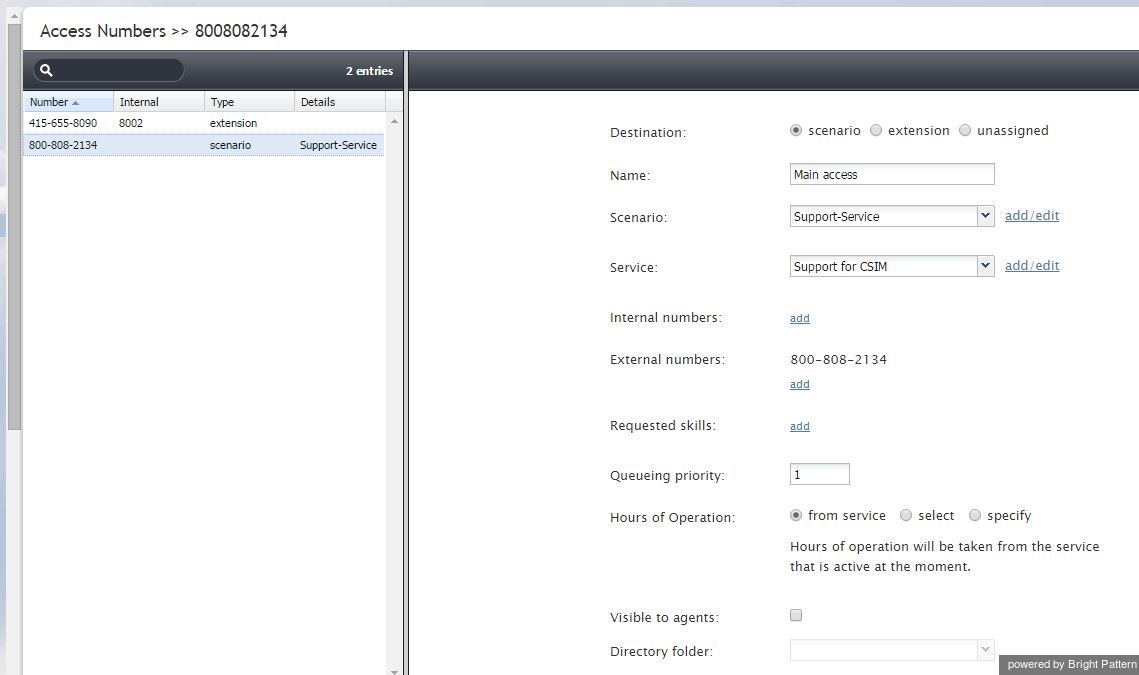Contents
- Introduction
- General Information
- Contact Center Configuration Process
- Initial General Configuration
- Inbound Voice and Chat Service Configuration
- Outbound Campaign Configuration
- Email Service Configuration
- Users and Teams
- Overview
- Users
- Forwarding and Voicemail Operation
- Teams
- Agent Dashboard Metrics
- Roles
- Privileges
- Skill Levels
- Help Screens
- Directory
- Scenario Entries
- Scenarios
- Services and Campaigns
- Services and Campaigns Overview
- Properties Tab
- Assignments Tab
- Lists Tab
- Dispositions Tab
- Activity Tab
- Numbers Tab
- Service Level Tab
- Outbound Tab
- Results Tab
- Archive Tab
- Canned Tab
- Email Tab
- Pre-defined Dispositions
- Outbound - General
- Outbound - Calling Hours
- Outbound - Dial Rules
- Outbound - DNC
- Outbound - Diagnostics
- Activity Forms
- Lists
- Tasks
- Call Center Configuration
- General Settings
- Integration Accounts
- Knowledge Base
- Calendars
- Hours of Operation
- State Calling Hours
- Auxiliary Skills
- Audio Treatments
- Shared Voice Segments
- Voicemail
- Omni-Channel Routing
- Chat Settings
- Email Settings
- Quality Management
- Reporting
- Security
- Appendices
Access Numbers
Access numbers are the telephone numbers of your contact center that can be accessed from the public telephone network. These numbers are initially configured and assigned to your contact center at the service provider level. With the Contact Center Administrator application, you can view the available external access numbers and associate them with scenarios, which defines how calls arriving at these numbers will be processed by the system. Such associations are called dial-in scenario entries.
You can also associate external access numbers with specific extension numbers of your contact center. In this case, all calls arriving at the external number will be delivered directly to the associated extension. This functionality is called Direct Inward Dialing (DID).
Access numbers can, and in some cases must, be used as caller IDs for regular outbound calls, campaign calls, and outgoing SMS communications. For more information about configuring caller IDs for regular outbound calls, see section Dial-out Entries. For more information about configuring caller IDs for campaign calls and SMS messages, see section Service and Campaigns - Numbers Tab.
Access numbers are also used in chat services to enable customers to request and carry on chat conversations via SMS. For more information about enabling inbound SMS function in chat services, see section Mobile and Web.
To view the available access numbers, select the Access Numbers option from the Directory menu.
All access numbers assigned to you by the service provider will appear in the list view. Numbers dedicated to SMS communications will appear in the [number]/SMS format.
Access number types displayed in the list view have the following meanings:
- If an access number is associated with an extension, its type will be set to extension, the extension number will appear in column Internal, and the user of that extension will appear in column Details.
- If a regular or SMS access number is associated with a scenario entry, its type will be set to scenario, and the scenario name will appear in column Details.
- If an SMS number is associated with a service, its type will be set to text out.
- If an SMS number is associated with both a scenario entry (for inbound SMS) and a service (for outbound SMS), its type will be set to scenario, text out.
- Access numbers that do not have any associations will have type unassigned.
To associate a selected access number with a scenario, set the Destination property to scenario, and edit the dial-in scenario entry properties that will appear in the right pane.
To associate a selected access number with an extension (the DID function), set the Destination property to extension, and specify the extension number in the field Extension. If the specified extension is a softphone, the name of the associated user will appear next to the entered number. If the specified extension is a hardphone, the internal Caller ID of the hardphone will appear.
By default, access numbers used as caller IDs will be transmitted exactly as they appear in the list view of the Access Numbers screen. If you wish to attach a prefix to an access number when it is used as a caller ID, select the Add prefix to all caller IDs checkbox and enter the desired digits in the Prefix field.
Note also that use of access numbers as caller IDs for campaign calls must be enabled at the service provider level. Where such use is restricted, the property pages of the corresponding access numbers will display a read-only parameter Restrictions set to No automated outbound dialing on this number.

